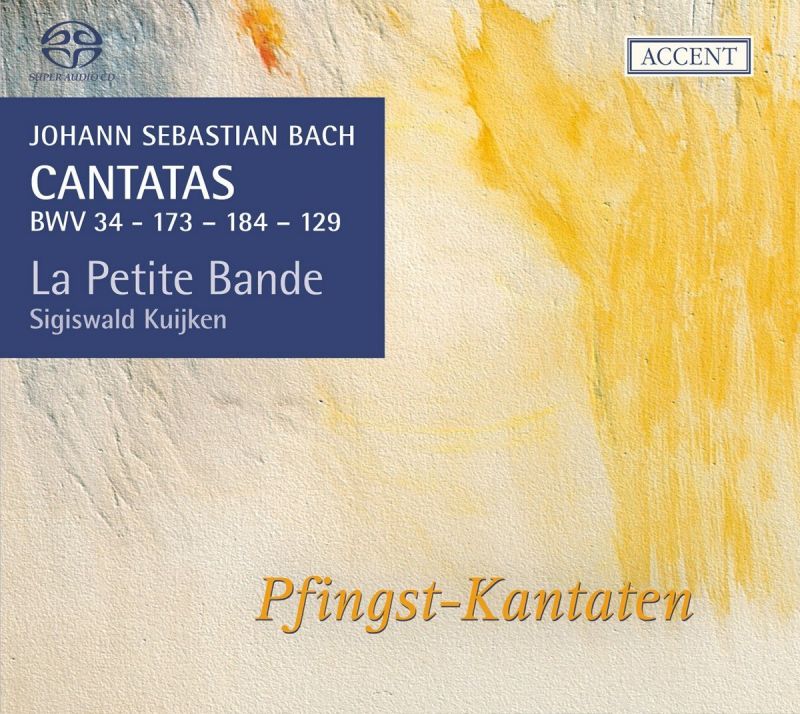JS BACH Cantatas Nos 34, 173, 184 & 129
More one-per-part cantatas from Kuijken’s Petite Bande
View record and artist detailsRecord and Artist Details
Composer or Director: Johann Sebastian Bach
Genre:
Vocal
Label: Accentus
Magazine Review Date: AW2013
Media Format: Super Audio CD
Media Runtime: 70
Mastering:
DDD
Catalogue Number: ACC25316

Tracks:
| Composition | Artist Credit |
|---|---|
| Cantata No. 34, 'O ewiges Feuer, O Ursprung der Li |
Johann Sebastian Bach, Composer
(La) Petite Bande Christoph Genz, Tenor Gerlinde Sämann, Soprano Jan Van der Crabben, Bass Johann Sebastian Bach, Composer Petra Noskaiová, Contralto (Female alto) Sigiswald Kuijken, Conductor |
| Cantata No. 173, 'Erhöhtes Fleisch und Blut' |
Johann Sebastian Bach, Composer
(La) Petite Bande Christoph Genz, Tenor Gerlinde Sämann, Soprano Jan Van der Crabben, Bass Johann Sebastian Bach, Composer Petra Noskaiová, Contralto (Female alto) Sigiswald Kuijken, Conductor |
| Cantata No. 184, 'Erwünschtes Freudenlicht' |
Johann Sebastian Bach, Composer
(La) Petite Bande Christoph Genz, Tenor Gerlinde Sämann, Soprano Jan Van der Crabben, Bass Johann Sebastian Bach, Composer Petra Noskaiová, Contralto (Female alto) Sigiswald Kuijken, Conductor |
| Cantata No. 129, 'Gelobet sei der Herr, mein Gott' |
Johann Sebastian Bach, Composer
(La) Petite Bande Christoph Genz, Tenor Gerlinde Sämann, Soprano Jan Van der Crabben, Bass Johann Sebastian Bach, Composer Petra Noskaiová, Contralto (Female alto) Sigiswald Kuijken, Conductor |
Author: Jonathan Freeman-Attwood
The same is certainly true in the pastoral, mini-‘scena’ alto aria of O ewiges Feuer – usually more memorable for the sparks of the framing trumpet-led chorus – and the chamber exchanges from the short vivace of No 173 to the segueing duets, whose courtly elegance reminds one of how brilliantly Bach transformed secular models, often to even more devastating liturgical effect. Most striking is the effortless refitting of congratulatory conceits for Prince Leopold towards a taut setting of ‘God so loved the world’.
As before in this series, the distilled nobility of the musicianship is heard to greatest effect in the beautifully turned instrumental contributions; the refined textures of joined strings and winds is often breathtakingly sympathetic – and in a world of increasingly homogeneous Baroque ensembles, the playing in the duet ‘Gesegnete Christen’ from No 184 is profoundly affecting.
For all the distinctive character evident in Kuijken’s canvases (and some ringing musical arguments for where large one-to-a-part Bach does work), one cannot avoid referring to the prime Achilles heel here: solo voices inconsistently able to realise Bach’s arias with the necessary emotional or technical equipment. The Trinity cantata (No 129), which closes the disc, fares rather better, especially with Gerlinde Sämann’s deft hovering above Bach’s exquisite whirling melismas for the ubiquitous Holy Spirit. So spot-on and yet so far.
Discover the world's largest classical music catalogue with Presto Music.

Gramophone Digital Club
- Digital Edition
- Digital Archive
- Reviews Database
- Full website access
From £8.75 / month
Subscribe
Gramophone Full Club
- Print Edition
- Digital Edition
- Digital Archive
- Reviews Database
- Full website access
From £11.00 / month
Subscribe
If you are a library, university or other organisation that would be interested in an institutional subscription to Gramophone please click here for further information.




